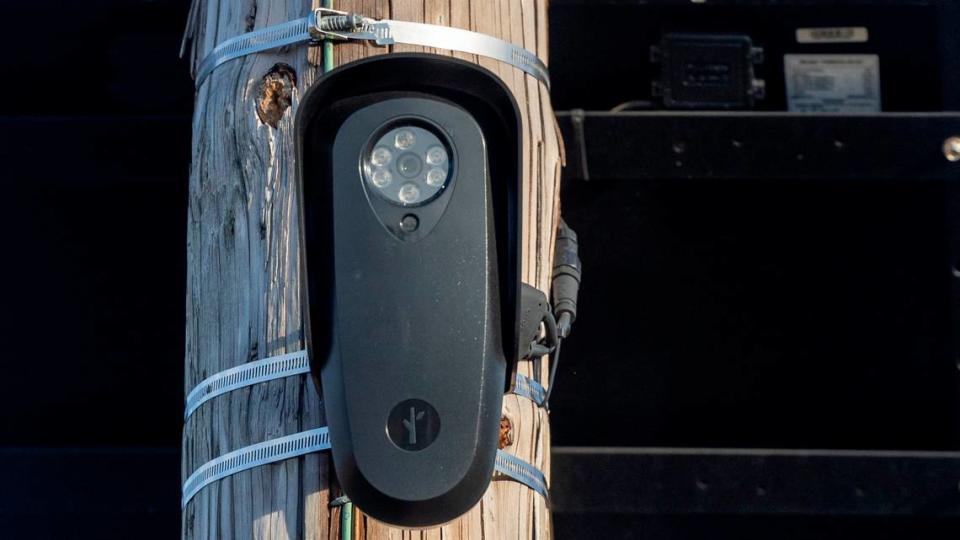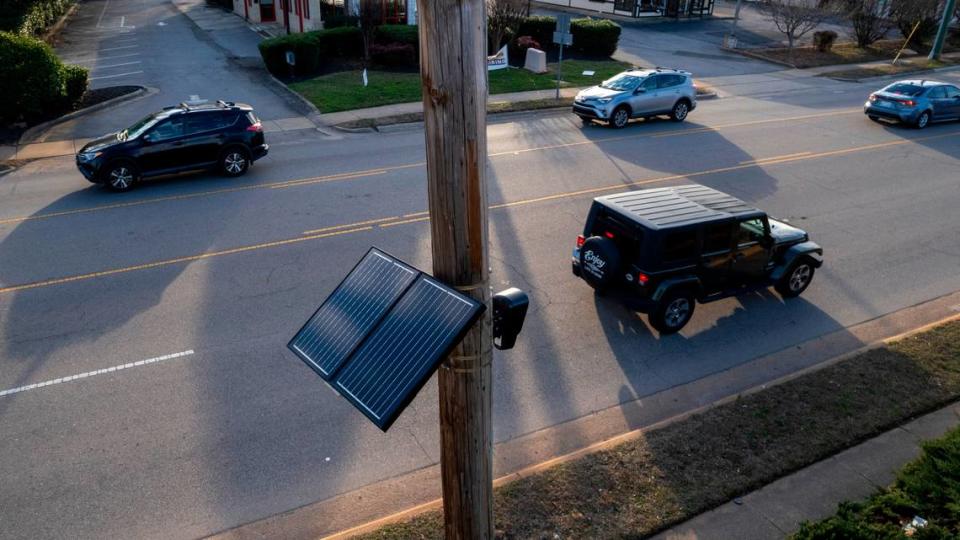Automated license plate reader cameras can be difficult to spot if you’re just driving by.
But along hundreds of streets in North Carolina, these shoebox-sized devices are quietly capturing details of every passing vehicle, data that is easily accessible to law enforcement across the country.
Until now, no one in North Carolina had a full picture of how widespread these cameras have become. But a News & Observer investigation shows they are a much more commonly used tool for law enforcement, who say the devices can act as a force multiplier in solving crime.
In our Private Eyes series, we show how these cameras have produced many success stories in closing cases: recovering stolen vehicles, locating missing children, and even arresting an attempted murder suspect who fled the state. But law enforcement’s embrace of these devices has also raised serious privacy concerns from groups worried about cases of misuse, over-surveillance and misidentification leading to arrests.
Here’s a look at five key things our reporting over the past few months has revealed.

From rare to regular in just a few years
Flock Safety started in 2017. It wasn’t until 2021 that it was officially registered to do business in North Carolina.
Yet in that time, the company has signed contracts with at least 80 law enforcement agencies in the state, from the Nags Head Police Department to the Buncombe County Sheriff’s Office, the N&O noted. Our survey of police and sheriff’s departments statewide has identified more than 700 Flock fixed cameras on North Carolina roadways to date, a number that far exceeds that of the company’s competitors such as Rekor and Motorola.
And because Flock does not sell its cameras – but leases them – this can mean a lot of money for the private company.
Contracts with several North Carolina customers show the cameras cost between $2,000 and $3,000 each annually. So a conservative estimate is that North Carolina law enforcement agencies spend more than $1.49 million annually on the devices.
And it’s not just about law enforcement. Flock sells its cameras to businesses and HOAs, which, as we explored in our series, sparked controversy in a Knightdale neighborhood.
Flock CEO Garrett Langley has discussed that explosive growth nationally, saying in a 2023 podcast in Atlanta that the company went from “single digit millions to over a hundred million in revenue” in four years.
Private Eyes: How We Tracked the Spread of License Plate Readers in North Carolina
ALPR cameras do not have the same protections
From the video camera in Target to the doorbell camera on your neighbor’s porch, Americans are already inundated with surveillance.
So what makes automated license plate readers from Flock or another vendor different?
Access, for example.
With few exceptions, the vast majority of private video surveillance is not readily available for investigation or review by law enforcement. Camera owners can transfer it upon request, of course. But enforcing the case requires an order from the court based on probable cause.
What if the police wanted GPS location data tracked by your phone? This also requires a search warrant filed with Google (at least before the company announced it would cut off access to such data at the end of 2023).
Can investigators track the location of your mobile device through cell towers? Or attach a GPS device to your car? Both techniques require search warrants, the US Supreme Court has ruled.
In North Carolina, state laws provide protection for license plate information recorded for certain non-law enforcement purposes.
For example, toll cameras capture and store images of vehicles and license plates for 90 days to bill drivers. But the agency needs a subpoena to provide police with all that footage, said N.C. Turnpike Authority spokesman Logen Hodges.
When police officers search for license plates or other vehicle data through an ALPR system like Flock, they don’t need a warrant – or any other external oversight. And while state law now makes misuse of ALPR devices a crime, privacy advocates are concerned.
However, Flock and police claim that license plate readers capture information that is available in public spaces where there is no expectation of privacy – the equivalent of a cop standing on a corner taking down every license plate number.


Across North Carolina, transparency is inconsistent
Much of the N&O’s reporting was based on collecting thousands of data points from Flock Safety’s transparency portals, websites that provide basic data about a department’s use of the cameras. That’s everything from the number of cameras they’ve installed to the number of cars they’ve detected in the past month.
The portals are optional and not all Flock customers have committed to using them.
Flock provided a list of about 30 agencies in North Carolina that use the transparency portals. That’s far fewer than the 80 or more agencies the N&O has independently counted using the service in the state to date.
A number of law enforcement agencies told us through our survey that they have no plans to use the sites.
Case in point: police at UNC-Chapel Hill. The university, which fought to keep its contracts with Flock Safety secret from the public before relenting earlier this year, “has not discussed the creation of a transparency portal,” spokesman Kevin Best said.
The N&O found more than 360 locations spread across the country. But it’s difficult to know how many of the company’s more than 5,000 law enforcement clients actually have their portals activated because the company hasn’t told us.
Neighbors watching neighbors? HOA vehicle surveillance irritates some in the NC neighborhood
Supervision in other states goes further than the regulations here
North Carolina has a law on the books that regulates the use of automated license plate readers.
The rules limit the retention of license plate data to 90 days and prohibit their use to enforce simple traffic violations. The law also requires agencies using these systems to have written policies that cover, among other things, training, supervision and “annual or more frequent audits.”
But the regulations don’t require anyone to monitor whether agencies are following their own rules.
And North Carolina law enforcement agencies aren’t always forthcoming about how they enforce those rules.
For example, the Raleigh Police Department has provided no evidence that an annual audit of its ALPR system has been completed.
New Jersey, on the other hand, publicly releases a report through the attorney general’s office in which law enforcement agencies have conducted audits and found violations and complaints.
The limit on how long North Carolina agencies can keep data, meanwhile, pales in comparison to New Hampshire’s.
The Granite State – whose motto is “Live Free or Die” – requires police to delete license plate information after three minutes. New Hampshire is one of only three states where Flock does not operate.
What is the future for these cameras on state highways? Not clear.
In recent years, lawmakers have introduced bills to overturn a decade-old legal interpretation that banned automated license plate readers on state-maintained roads and highways. Those efforts repeatedly failed over objections from Republican lawmakers with privacy concerns about the technology.
In early 2023, a new version of the bill received support from law enforcement officials, including Raleigh Police Chief Estella Patterson and Nash County Sheriff Keith Stone, who testified to lawmakers that the devices were crucial tools for fighting crime.
The Legislature passed the measure in October, prioritizing the devices at the N.C. Department of Transportation through a pilot program run by DOT and the State Bureau of Investigation. The SBI, either alone or on behalf of a local law enforcement agency, would have to enter into an agreement with NCDOT regarding where to locate the devices.
That likely means more ALPR cameras along 80,000 miles of streets in North Carolina. But when those new cameras will appear – it’s hard to say.
Despite the law taking effect in January, neither agency has provided any details on how they will implement it.
“Discussions and meetings continue” on the implementation of the pilot project, SBI spokesperson Angie Grube said in early April. After The N&O checked in last week, Grube said the agency had nothing to announce.
As of Thursday, NCDOT has not received any requests to install the devices, according to spokesman Aaron Moody.





